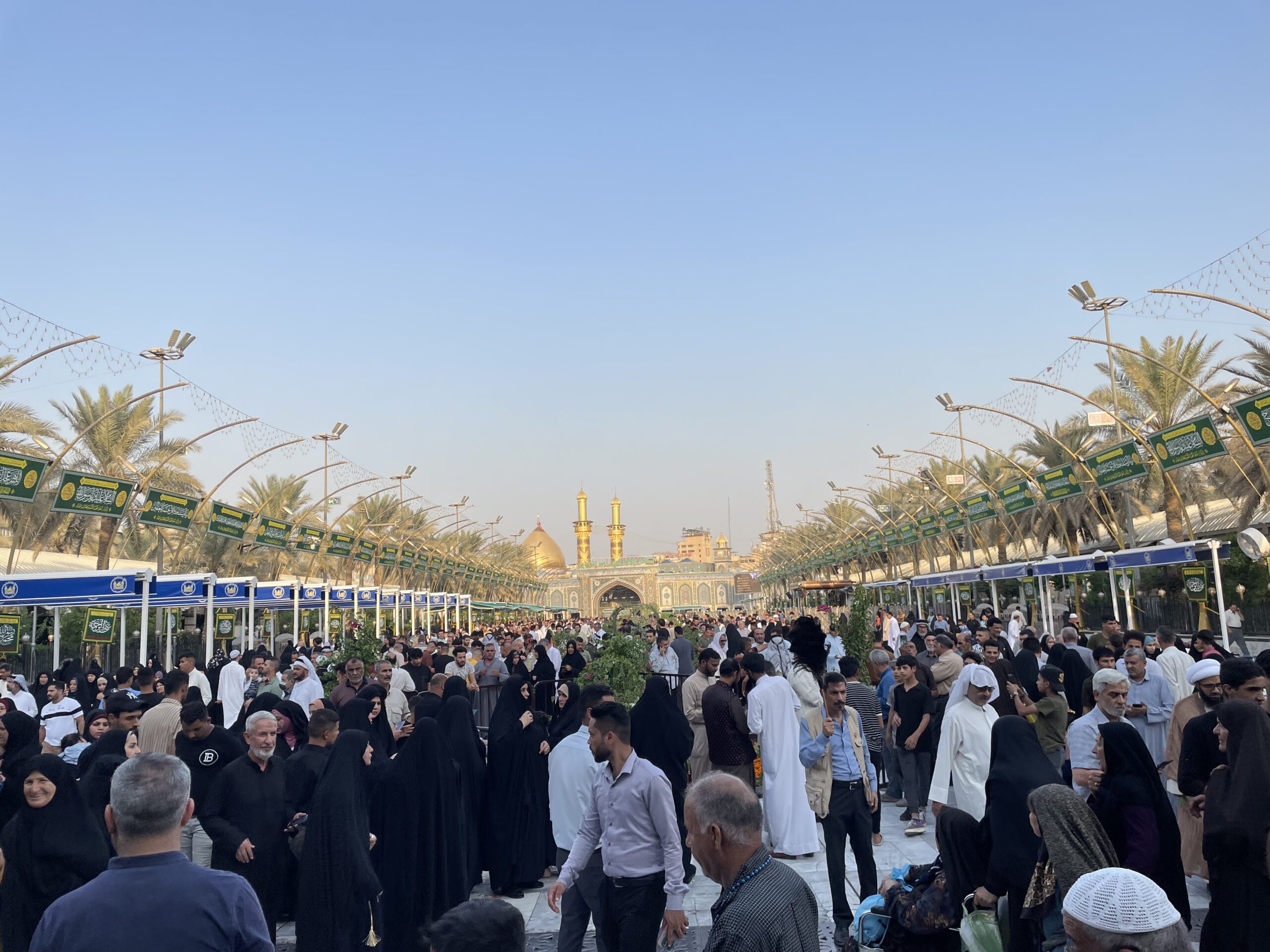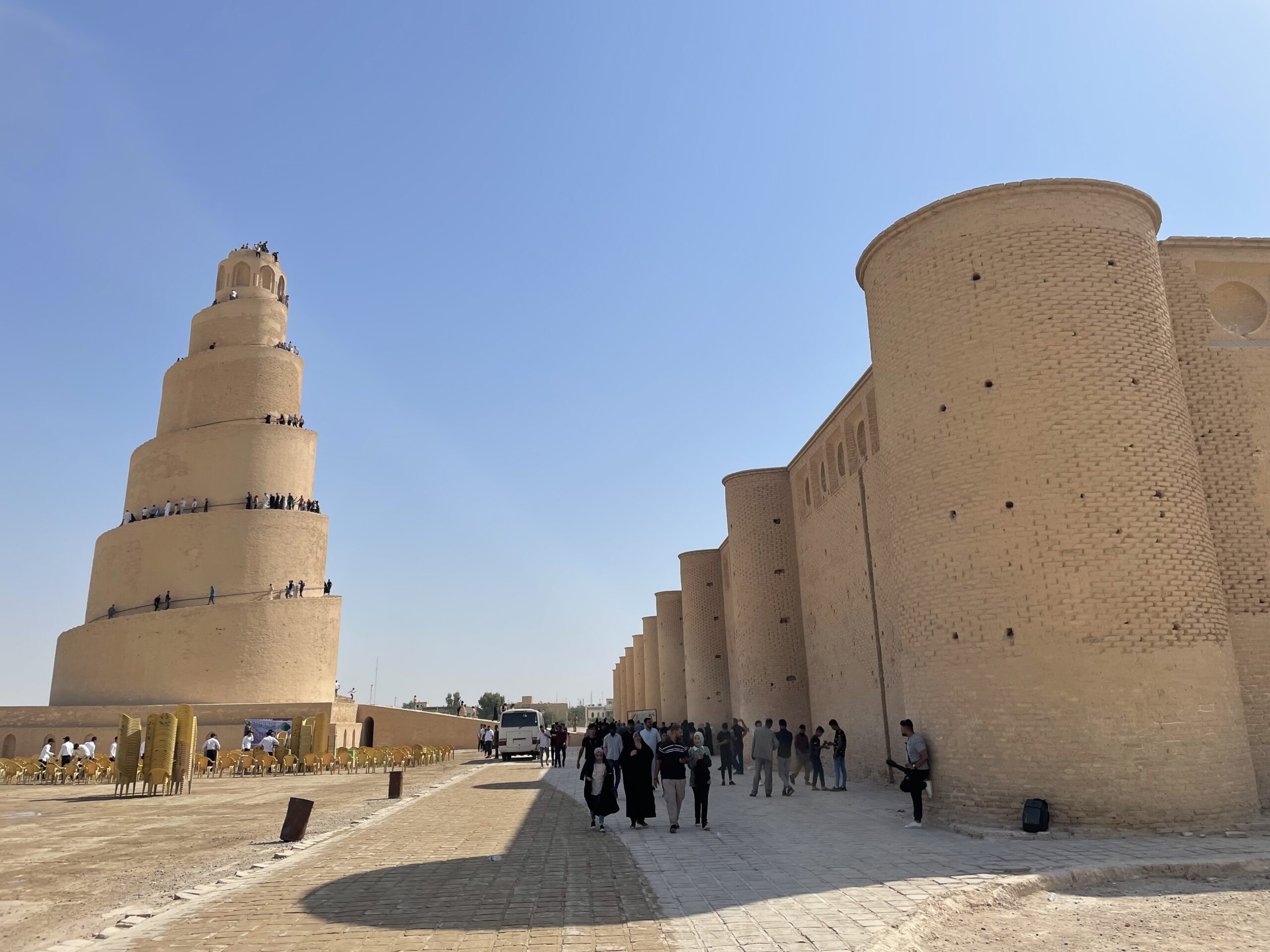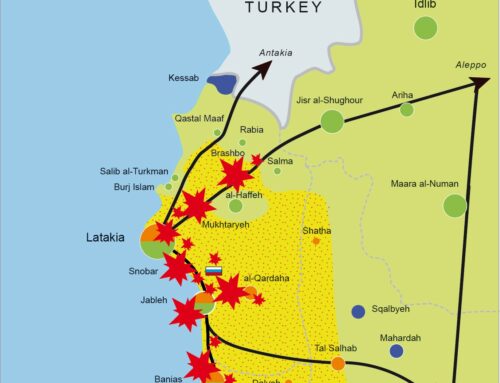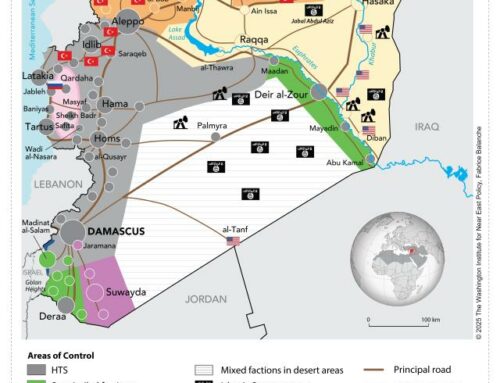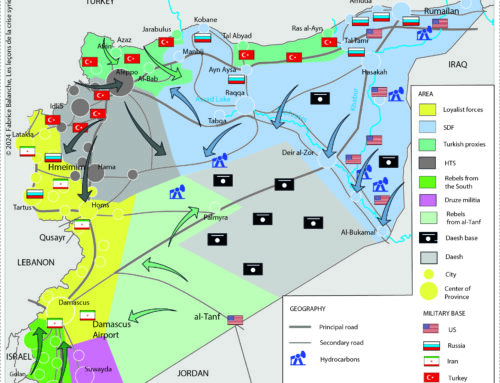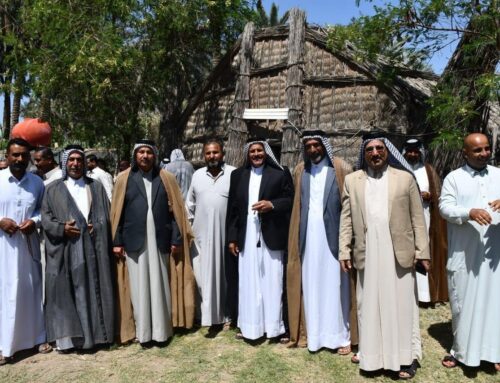The specialist in Iraq and Syria, Fabrice Balanche, author of “The lessons from the Syrian crisis” (2024), examines the political and security news in Iraq in view of recent events in an interview for the CFRI. 3rd April 2024
On February 26, 2023, France and Iraq signed a strategic treaty for the first time (51 articles), how to analyze this strategic treaty between Baghdad and Paris?
Emmanuel Macron’s France dreams of replacing the United States in Iraq, or, at least, ensuring a privileged position in the country. This strategy, which was set up by E. Macron followed his official trip in August 2021, as well as his participation in the first summit in Baghdad and the visit to Karbala. The latter, very important, paid tribute to the Shiite community, in the hope of strengthening relations with Iraq.
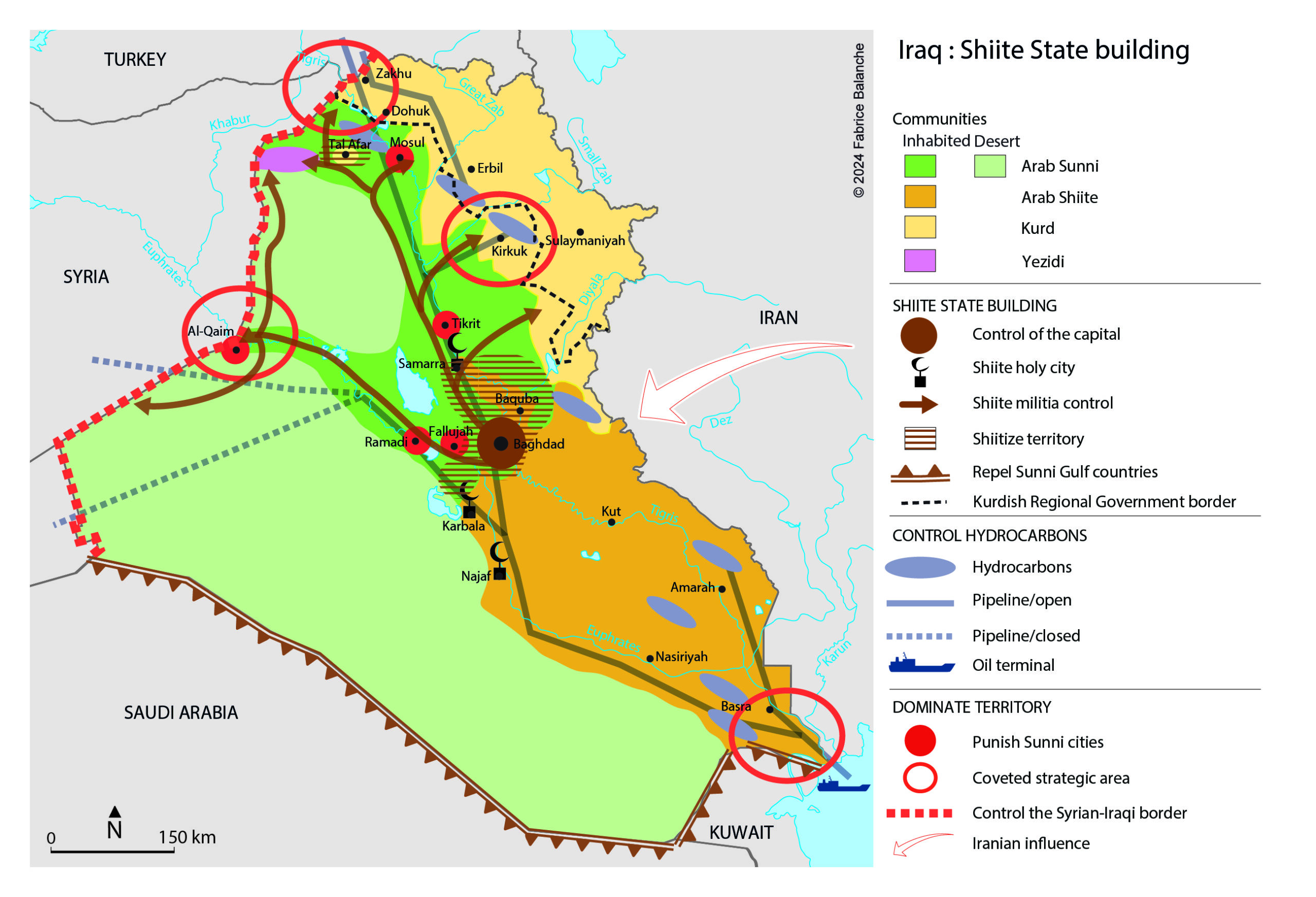
Iraq shiite state building
The French analysis aims to support this federal Iraq hoping that it can distance itself from Tehran, which amounts to playing on the Iraqi nationalist feelings, given that a part of the Shiite political class struggles to support the Iranian supervision. This was more possible during the era of Moustafa al-Kazimi, who was less dependent on pro-Iranians and, arguably, more pro-Western. The situation became complicated with the elections and the coming to power of Mohammed Shia al-Soudani, since the new Prime Minister called into question the various contracts signed by his predecessor with France. The best example of a French fiasco was probably the Mosul airport project, whose contract was initially awarded to France (Paris Airport) and which was finally entrusted to a Turkish company. The same was true for all the difficulties surrounding the Total contract, which included a $27 billion transaction in southern Iraq. After much hesitation and under pressure from the French state for Total to sign an agreement with Iraq, the French share was reduced to 45%, because the state-owned Iraqi oil company (Basrah Oil Company) now participates at the level of 30%, while the Qatari public company (Qatar Energy) entered the consortium and snagged the remaining quarter. This nevertheless poses a problem for Total, which must be very careful about the subcontractors that the Iraqi partner offers, by checking, for example, that they are not linked to the Iranian Revolutionary Guards or to companies under sanctions. The American Treasury could therefore impose a fine for having used the dollar in financial transactions with Iran comparable to that of the BNP in 2017, which amounted to 10 billion dollars.
In addition, the third Baghdad summit which was to be held in November 2023 was canceled by Iraq due to the war in Gaza. Paris has announced its postponement to February 2024. But ultimately it didn’t happen. Obviously French diplomatic efforts to restore Iraq’s place in the concert of Middle Eastern nations have not been crowned with success. The second Baghdad summit (December 2022) which took place in Amman was much less popular with local leaders, and, although the Emir of Qatar was present, the other leaders did not make the trip and preferred sending their foreign ministers. While during the first summit in Baghdad, most of the decision-makers had come, E. Macron had hopes of reproducing this commitment with France on the front line, but the results did not live up to the expectations of the French president. It is likely that the annual series of Baghdad summits will be abandoned in the future.
The French strategy, consisting of supporting an Iraqi Shiite power, which we would like to see become anti-Iranian, corresponds to that of the United States, born in 2003, when all of Washington’s efforts were aimed at building an Iraq dominated by the Shiites with the aim of creating a direct competitor to Iran. This failure highlights the problem associated with supporting political forces in Iraq, which could oppose the influence of the Islamic Republic, even if this path is not currently favored.
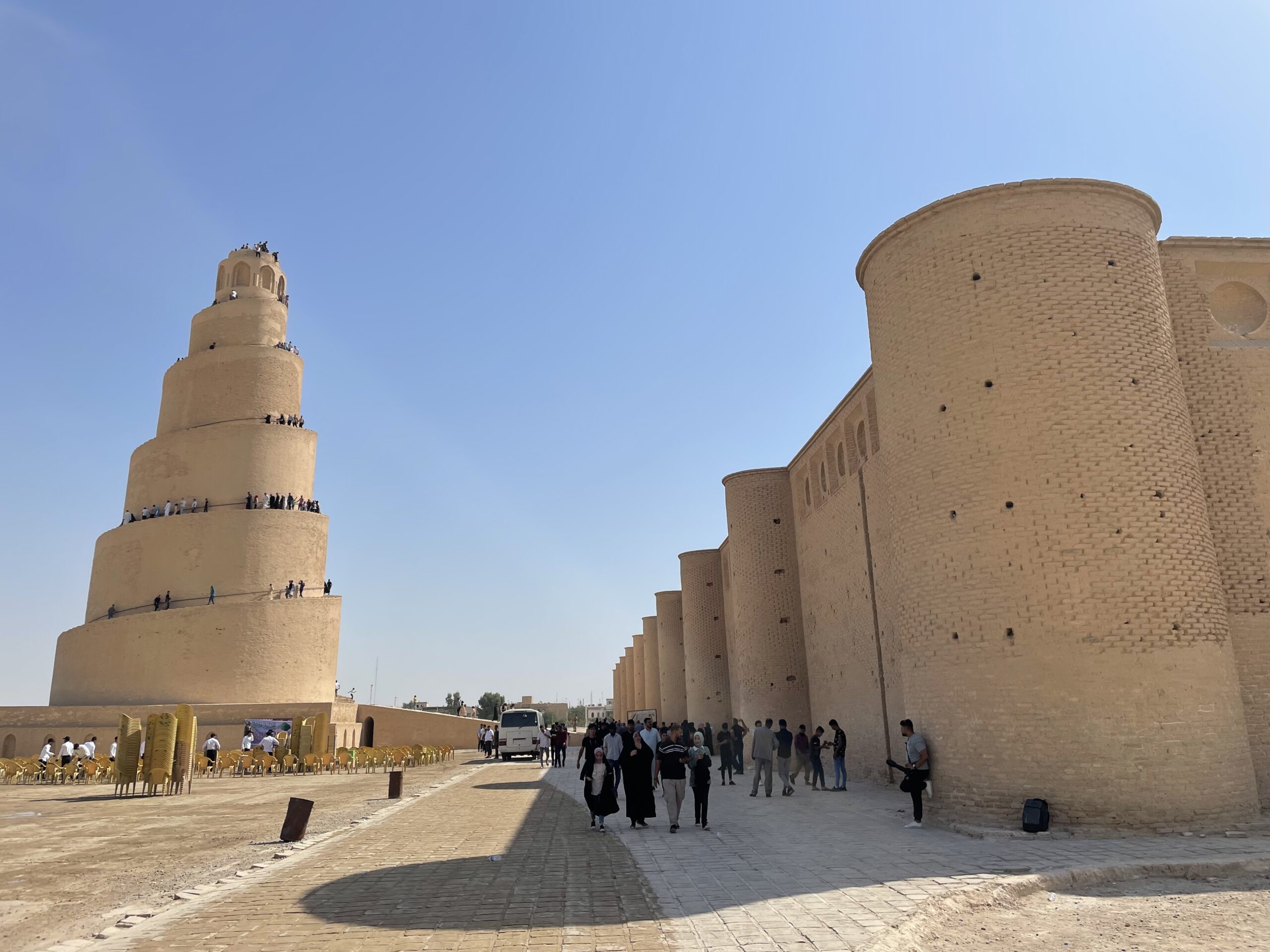
Samarra – October 2022
Nevertheless, France can find some consolation in potential trade surpluses with Iraq. However, this prospect is far from simple due to American domination and the rise of China, which manages to capture significant market shares. France exported less than 400 million euros in 2022 and, on the other hand, imported more than 1.4 billion euros of hydrocarbons. We are only the twentieth supplier to Iraq, far behind China, Turkey and India. It is now known that the Chinese exploit more than 50% of Iraqi oil, benefiting from the absence of sanctions from the US Treasury and an ability to work effectively with the Iraqis, notably using corruption mechanisms. They also benefit from Iranian protection, which arises from strategic agreements between Iran and China, where the Iranians ensure the security of Chinese interests in Iraq in exchange for remuneration on their bilateral trade.
Iraq is in the midst of negotiations with the international coalition present in the territory to fight against Daesh (Inherent Resolve mission) to end this mission and sign bilateral agreements. As a researcher specializing in Iraq, how and in what context will France be able to negotiate a bilateral agreement to maintain its military presence in Iraq?
France should anticipate the inevitable withdrawal of the international coalition which is an official request from the Iraqi government from now on and not just a vote of Parliament, as in winter 2020, after the strike which killed Qassem Soleimani (Iranian general) and Abou Mehdi el- Mouhandis (leader of Kataeb Hezbollah). At that time, Mr. al-Kazimi, then in power, did not consider the wish of Parliament. In addition, Sunnis and Kurds did not participate in the session, limiting the decision to Shiite deputies only. This incidentally led to a volley of Iranian missiles on Erbil, since Masoud Barzani was the main opponent of this measure.
Today, the Iraqi government is negotiating the departure of this coalition, pushed by Iran. The American presence in Iraq, as well as in Syria, will be collateral damage of the war in Gaza since the objective of the Iranians is to drive the United States from the area in order to create a real axis by controlling Lebanon, the Syria and Iraq. Indeed, if the Americans leave Iraq, they will also be forced to give up Syria, which will undoubtedly result in the end of Kurdish autonomy in the country and its return to the fold of the regime. In addition, we can also have fears for the Kurdish regional government in Iraq which risks, as in 2017, after the referendum and the capture of Kirkuk and the disputed territories, seeing the Shiite militias advance, particularly in the north in Faysh Khabur and Ibrahim Khalil to retake all border crossings with Syria and Turkey. This would block the export of Kurdish oil to the Mediterranean as well as all transit of goods to the north. We can therefore have a renewal of this scenario.
France should begin the same process as the United States and negotiate a bilateral treaty in order to be able to maintain a military presence in Iraq in partnership with the United States which has bases in Erbil, Aïn al-Assaad and Baghdad. Since 2014, Paris has participated in the anti-Daesh coalition (Operation Chammal) by providing military assistance with, for example, the use of Caesar cannons and aircraft in strikes targeting Daesh, but also the training of Iraqi forces.
Given that Daesh remains a threat, this security collaboration should remain, even though France naturally hopes to benefit from this military cooperation, which could involve the sale of weapons. However, Paris cannot provide equipment that is too sophisticated, because it could fall into the hands of Tehran, or even the Russians and Chinese, who could reproduce it. It is therefore not a question of delivering bursts, but rather transport or combat helicopters, less strategic, but nevertheless relevant, even if these markets are not very important. The major problem obviously remains the submission of the Iraqi army to the Shiite militias who use its arsenals. If substantial sales of military equipment are not possible, an alternative could be the conclusion of contracts in other sectors, as we have already seen with the case of Mosul airport or the oil industry with Total. However, France also encounters significant difficulties in obtaining these contracts and achieving a real return on investment from its security cooperation.
It is therefore possible that the French were discouraged by this situation, noting that their diplomatic efforts and their military collaboration with Iraq did not yield the expected results. This could explain why no bilateral treaty has yet been established.
We are currently seeing a virulent debate in Iraq calling for an end to the UN mission, present since 2003, in the territory. In what context can this mandate end and what will be the consequences of the end of this mission for the different components of Iraqi society?
Following the American intervention, the UN mission responsible for the reconstruction of Iraq began in 2003. However, its current relevance is called into question, because the country is no longer in the context of emerging from a twelve-year embargo and a civil war. Thanks to hydrocarbon exports, which amount to around 4.3 million barrels per day (in 2023), around three quarters of which are intended for export, the country now has significant resources and a legitimate government to manage them. The question therefore arises as to whether the presence of this mission remains necessary. Furthermore, even in areas seriously affected by Daesh, such as Mosul, the UN is not on the front line of reconstruction, which is primarily based on private initiatives. Although UNESCO programs participate in the reconstruction of historic monuments, the organization’s role is not decisive in the entire process. And, in my opinion, this mission is no longer essential. Furthermore, it certainly reminds Iraqis of the dark hours of the American occupation and, in the context of the restoration of Iraqi sovereignty, it would be consistent for it to be abolished.
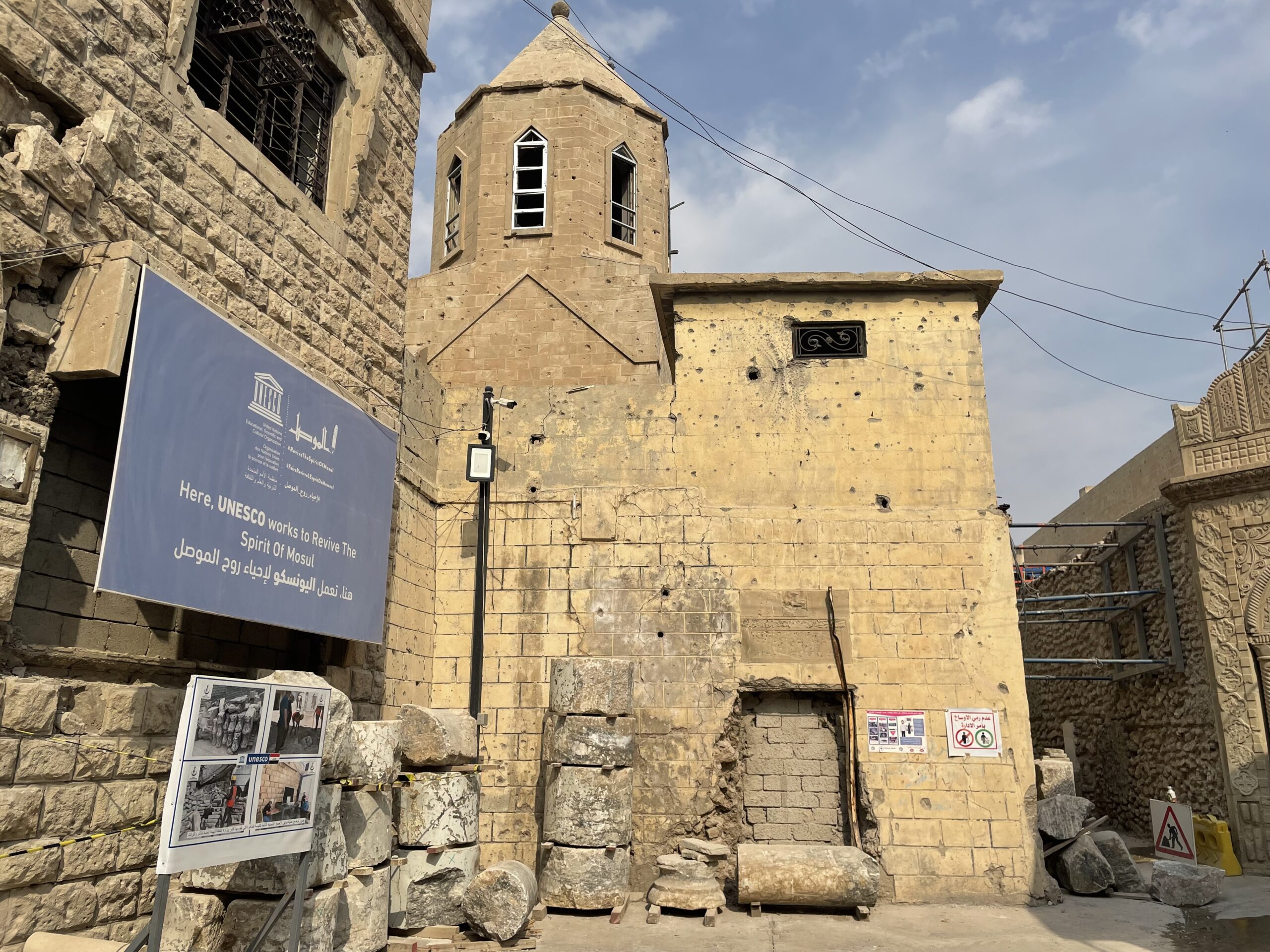
Mosul church, UNESCO project, October 2021
Since 2017, Iraq has announced the territorial defeat of the Daesh caliphate. Six years later, is this still the case? Does the terrorist group still pose an existential and strategic threat to Iraq and the region?
Daesh has gone underground again, operating through sleeper cells and maquis in Syria and Iraq. The fighters are blackmailing traders and the local population, causing great fear. The investigations I carried out in the Mosul region highlight this persistent fear of being the victim of Daesh attacks. For example, arrests and convictions are limited due to judges’ anxiety about being assassinated and women continue to wear Islamic dress. This apprehension is palpable, and many are convinced of the return of Daesh. The context is similar in Syria, particularly in Raqqa and Deir ez Zor, where the Syrian Democratic Forces are often attacked by jihadists. However, the situation in Iraq is more under control, thanks to the intervention of the International Coalition. The terrorist organization’s attacks on prisons in Hasakah in January 2022 and in Raqqa in December 2022 highlight the existence of sleeper cells and their ability to mobilize local support. Information provided by the FDS intelligence services indicates that Daesh is recruiting new fighters among destitute, frustrated or drugged people, in a region where Captagon trafficking is wreaking havoc.
Daesh is therefore still in Syria, waiting for an opportunity for instability to resurface. For example, a major attack by Turkey in northeastern Syria or an offensive by Shiite militias on Deir al-Zor could prompt ISIS to attempt to re-liberate captured jihadists and rally the Arab tribes who had supported him between 2014 and 2017. Indeed, in October 2019, during the Turkish attack in northeast Syria, we immediately saw the jihadists resurface. They took the opportunity to invade the countryside, infiltrate Qameshli and organize attacks, notably with car bombs. The terrorist group has an estimated 10 to 15,000 fighters between Syria and Iraq, with tens of thousands of sympathizers ready to be mobilized. By extension, Daesh could return to Iraq as was the case in 2014. Although the situation may be stable, we still feel great frustration among the Sunni population. The ouster of Mohamed al-Halboussi, the president of Parliament, in November 2023, shows that for the Sunnis there is no hope of regaining power and having significant influence, because all the Sunni political leaders in Iraq who emerge will be cut. If the Sunnis do not have a political expression, they will undoubtedly have a terrorist expression, particularly through Daesh. In addition, a re-destabilization of northeastern Syria would allow Daesh fighters to flock to Iraq and re-sow chaos. It is also important not to underestimate the destabilizing potential of Syrian refugees in Lebanon and Jordan, as well as Iraqi Arabs in Erbil and Souleymanyeh. Their precarious situation provides a recruiting ground for Daesh and contributes to the risk of instability in the region.
Western powers strongly support the project of Iraqi sovereignty. In this project of national sovereignty, how could non-state actors, including militia organizations, be considered (confrontation, eradication, integration, acceptance, etc.)? Do you think that the presence of these militia organizations can prevent the establishment of complete sovereignty?
The militias in Iraq are the tools of Shiite political parties, particularly those linked to Iran. In this context, how can Iraqi sovereignty be restored when Iran seeks to make it a vassal state, using these militias as a means of control over the country? Despite efforts to strengthen the national army, it remains weak, due to the influence of Tehran and the militias. Neighboring states, such as Turkey and Saudi Arabia, are also reluctant to see a strong Iraqi army, due to their distrust of Iraq’s militaristic potential, a legacy of the Saddam Hussein era. Under these conditions, militias thrive and undermine Iraqi sovereignty by hindering the army’s attempts to control the borders and effectively defend the territory. Although the military career continues to attract young people because of the salaries, the institution is marginalized and mistreated by the militias, who have the upper hand. Thus, restoring Iraqi sovereignty would require rebuilding a powerful army, but this faces obstacles, both internally and externally. Furthermore, with the planned departure of the International Coalition, the elite units formed by it, such as the Delta force, risk being disbanded or ostracized.
Western countries have supported and still support the sovereignty of a united Iraq in the hope of creating a Shiite counterweight to Tehran, but this is proving ineffective, because they lack the means, and the ethnic-confessional fragmentation makes it difficult to re-establish this sovereignty. Since 2003, they have therefore sacrificed the independence of Kurdistan for a pipe dream. Today, the power of the “Eurasian axis” (China, Russia and Iran) in the region and particularly in Iraq should force the West to review their strategy with regard to Iraq.
The year 2025 will see the next legislative elections held in Iraq. What do you think are the possible scenarios, and do you think that the country could fall into instability, as was the case in 2021?
As long as Iraq continues to enjoy a good financial situation thanks to oil revenues, it is unlikely to face major instability. In 2021-2022, Sader lost credibility by forcing his deputies to resign, which favored the arrival of pro-Iranians in parliament. Since then, he has remained fairly calm, he has not mobilized his troops much and especially has not tried to invade the green zone again. Economically, the situation is not disastrous: salaries have been increased and jobs have been created in the public service. Mr. S. al-Soudani adopted a conciliatory approach by redistributing oil revenues to buy social peace. Nevertheless, Iraq remains vulnerable to potential problems that could lead to destabilization. First, the possibility that the conflict in Gaza spills over into Lebanon and Syria, and that the Israelis attack Iran, puts Iraq at risk of being drawn into chaos.
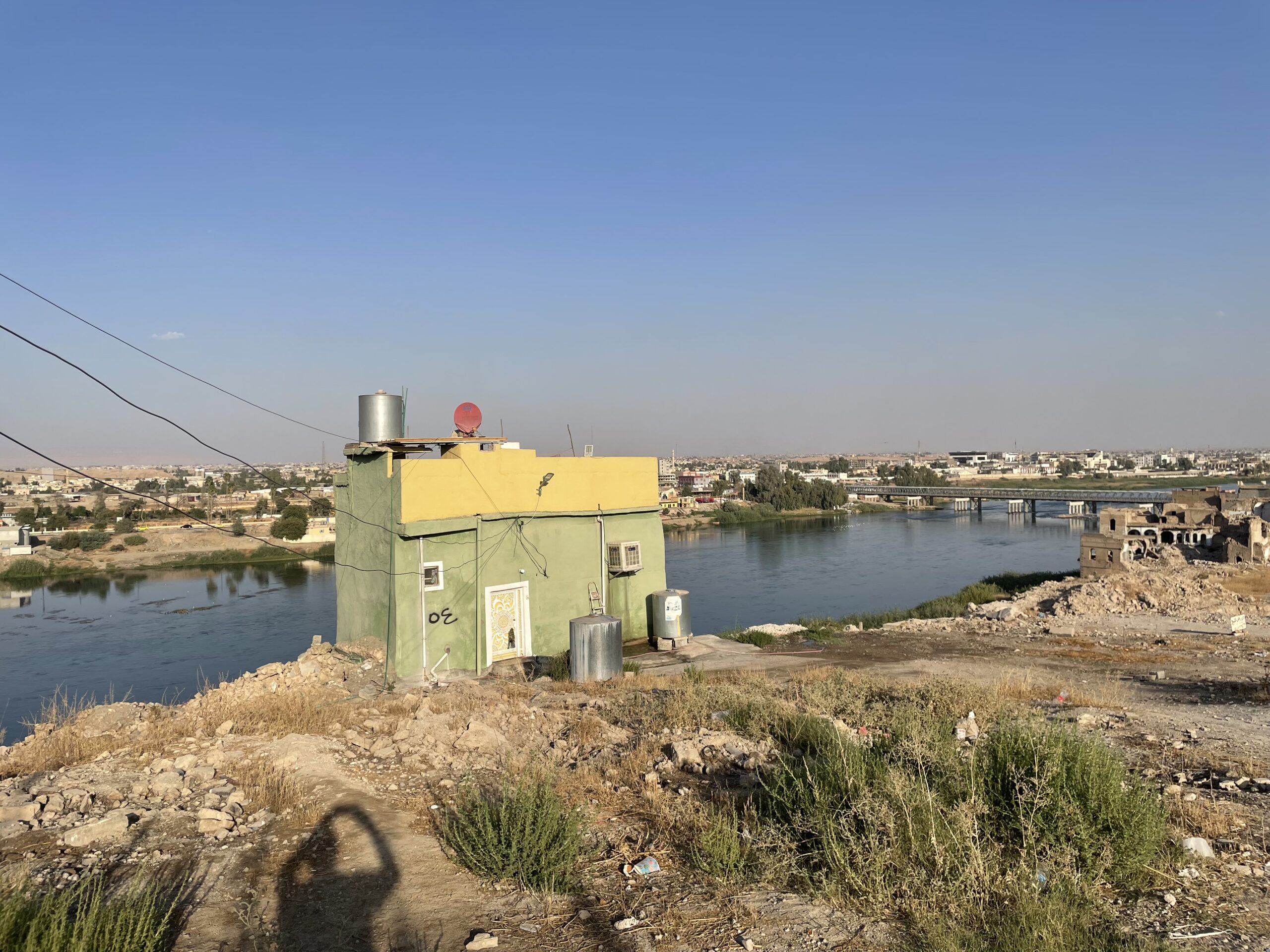
Mosul Tigris River, October 2022
In addition, the country is facing a serious water shortage crisis. In just fifteen years, it has gone from a situation of abundance, with 2,000 m3 of water available per inhabitant per year, to a critical situation, with less than 500 m3. This crisis is due to dams in Turkey and Iran, the reduction in precipitation and the increase in consumption linked to demographic growth (43 million inhabitants in 2023 compared to 25 million in 2000). Iraqi leaders do not seem to really take this crisis into account, contenting themselves with protesting against the water retention practiced by Ankara, but without taking concrete measures such as recycling water and modernizing irrigation techniques. Cultivated land between Baghdad and Basra is shrinking every year, leading to massive population displacements towards the “misery belts” around these cities. This situation could potentially destabilize the country, especially if water restrictions and electricity shortages become more severe, which could trigger riots, as is happening repeatedly in Basra and even on the outskirts of Erbil, Last year. In addition, there is still tension between federal Iraq and the autonomous Kurdish region since Baghdad seeks to financially strangle the latter.


